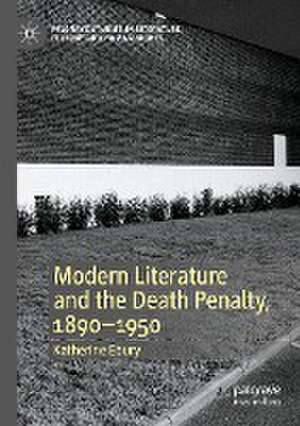Modern Literature and the Death Penalty, 1890-1950: Palgrave Studies in Literature, Culture and Human Rights
Autor Katherine Eburyen Limba Engleză Paperback – 24 feb 2022
| Toate formatele și edițiile | Preț | Express |
|---|---|---|
| Paperback (1) | 453.21 lei 6-8 săpt. | |
| Springer International Publishing – 24 feb 2022 | 453.21 lei 6-8 săpt. | |
| Hardback (1) | 530.58 lei 6-8 săpt. | |
| Springer International Publishing – 24 feb 2021 | 530.58 lei 6-8 săpt. |
Preț: 453.21 lei
Nou
Puncte Express: 680
Preț estimativ în valută:
86.72€ • 92.74$ • 72.31£
86.72€ • 92.74$ • 72.31£
Carte tipărită la comandă
Livrare economică 17 aprilie-01 mai
Preluare comenzi: 021 569.72.76
Specificații
ISBN-13: 9783030527525
ISBN-10: 3030527522
Pagini: 282
Ilustrații: IX, 282 p.
Dimensiuni: 148 x 210 mm
Greutate: 0.39 kg
Ediția:1st ed. 2021
Editura: Springer International Publishing
Colecția Palgrave Macmillan
Seria Palgrave Studies in Literature, Culture and Human Rights
Locul publicării:Cham, Switzerland
ISBN-10: 3030527522
Pagini: 282
Ilustrații: IX, 282 p.
Dimensiuni: 148 x 210 mm
Greutate: 0.39 kg
Ediția:1st ed. 2021
Editura: Springer International Publishing
Colecția Palgrave Macmillan
Seria Palgrave Studies in Literature, Culture and Human Rights
Locul publicării:Cham, Switzerland
Cuprins
Introduction: Modern Cultures of the Death Penalty.- Chapter 2: Confession and the Self in a Death Penalty Context.- Chapter 3: Psychoanalysis and the gothic death penalty.- Chapter 4: Life-writing and Capital Punishment.- Chapter 5: Animal Pain and Capital Punishment.- Chapter 6: Sex, Gender and the Death Penalty in Joyce, Yeats and the 1916 Generation.- Chapter 7: ‘Literature, the Death Penalty, and War Trauma’
Recenzii
“Ebury’s book is a rich archive of sources, suggestive connections, and strong readings of interest to scholars of modern literature. … Ebury’s book will be of interest to scholars of modern literature, psychoanalysis, and law, for it effectively makes the case that reading the ways these discourses are braided together in the history of capital punishment is not just generative but necessary.” (Ariela Freedman, James Joyce Quarterly, Vol. 59 (3), 2022)
Notă biografică
Katherine Ebury is Senior Lecturer in Modern Literature at the University of Sheffield, UK. Her previous publications include Modernism and Cosmology (2014) and Joyce’s Non-Fiction Writings (2018), as well as several articles and chapters. The present volume has been generously supported by an AHRC Leadership Fellowship.
Textul de pe ultima copertă
This book examines how the cultural and ethical power of literature offered early twentieth-century readers opportunities for thinking through capital punishment in the UK, Ireland and the US in the period between 1890 and 1950. Modern Literature and the Death Penalty, 1890-1950 therefore considers how connections between ‘high’ and ‘popular’ culture seem particularly inextricable where the death penalty is at stake. This book will consider a range of forms, including: short stories; pulp fiction; detective fiction; plays; polemic; criminological and psychoanalytic tracts; letters and memoirs by condemned persons and by executioners; and major works of canonical literature by authors including James Joyce, Theodore Dreiser, Elizabeth Bowen, Graham Greene, Flann O’Brien. Cases of the death penalty that sparked particular public debate and had substantial literary influence are explored, including the Roger Casement Case (UK (Ireland) 1916), the Edith Thompson case (UK,1923) and the Leopold and Loeb case (USA, 1924).
Caracteristici
Examines how literature represents and participates in debates around capital punishment in the first half of the twentieth century Incorporates original archival work on penal policy and unearths neglected literary and cultural texts Argues for the importance of the wider dissemination of psychology, which affected public perceptions of the death penalty and its representation in texts



